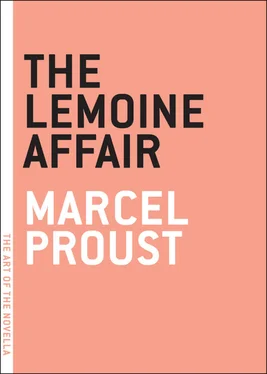Marcel Proust
The Lemoine Affair
The reader may have forgotten, since ten years have now passed, that Lemoine, having falsely claimed to have discovered the secret of making diamonds and having received, because of this claim, more than a million francs from the President of De Beers, Sir Julius Werner, who then brought action against him, was afterwards condemned on July 6, 1909 to six years in prison. This legal affair, which, although insignificant, enthralled public opinion at the time, was selected one evening by me, entirely by chance, as the common theme for a few short pieces in which I would set out to imitate the style of a certain number of writers. Even though offering even the slighest explanation of one’s pastiches risks diminishing their effect, nonetheless, lest one’s own legitimate self-esteem be ruffled, I might remind the reader that it is the pastiched writer who is imagined as speaking, faithful not only to his particular mind, but also to the language of his time. In the piece by Saint-Simon for example, the words “good man, bonhomme ” and “good woman” do not at all have the familiar, condescending slant they have today. In his Memoirs , Saint-Simon throughout says “good man Chaulnes” ( le bonhomme Chaulnes ) for the Duc de Chaulnes, for whom he had infinite respect, and likewise for many others.
— Marcel Proust
In one of the last months of the year 1907, at one of those “routs” of the Marquise d’Espard thronged with the elite of Parisian aristocracy (the most elegant in Europe, according to M. de Talleyrand, that Roger Bacon of the social organism, who was both a bishop and Prince of Benevento), de Marsay and Rastignac, Comte Félix de Vandenesse, the Ducs de Rhétoré and Grandlieu, Comte Adam Laginski, Maître Octave de Camps, and Lord Dudley, formed a circle around Mme the Princesse de Cadignan, yet without arousing the jealousy of the Marquise. Isn’t it in fact one of the greatnesses of the mistress of the house — that Carmelite of worldly success — that she must sacrifice her coquetry, her pride, her very love, to the necessity of creating a salon in which her rivals will at times be the most striking ornament? Isn’t she in that respect equivalent to a saint? Doesn’t she deserve her share, so dearly acquired, in the social paradise? The Marquise — a young lady from Blamont-Chauvry, related to the Navarreins, the Lenoncourts, and the Chaulieus — held out to each newcomer the hand that Desplein, the greatest scholar of our time (without excepting Claude Bernard) who had been the student of Lavater, declared was the most profoundly mapped he had ever been given to examine. All of a sudden the door opened to the illustrious novelist Daniel d’Arthez. A physicist of the moral world who possessed the genius of both Lavoisier and Bichat — the creator of organic chemistry — would alone be capable of isolating the elements that compose the special sonority of the footsteps of superior men. Hearing those of d’Arthez resound you would have trembled. Only a sublime genius or a great criminal could have walked thus. But isn’t genius a kind of crime against the routine of the past that our time punishes more severely than crime itself, since scholars die in hospitals bleaker than any prison?
Athénaïs did not feel any joy at seeing return to her home the lover she hoped to snatch away from her best friend. Thus she pressed the hand of the Princess while preserving the impenetrable calm that women of high society possess at the very instant they are burying a dagger in your heart.
“I am happy for you, my dear friend, that Monsieur d’Arthez has come,” she said to Mme de Cadignan, “all the more so since he will be completely surprised; he did not know you would be here.”
“He probably thought he would meet Monsieur de Rubempré here, whose talent he admires,” Diane replied with an affectionate pout that hid the most biting raillery, since everyone knew that Mme d’Espard did not forgive Lucien for having abandoned her.
“Oh! my angel,” the Marquise replied with a surprising ease, “we cannot stop people like that, Lucien will undergo the fate of little d’Esgrignon,” she added, confounding all those present by the infamy of these words, each one of which was an overwhelming taunt for the Princess. (See The Cabinet of Antiquities .)
“You are speaking of Monsieur de Rubempré,” the Vicomtesse de Beauséant said, who had not reappeared in society since the death of M. de Nueil and who, out of a habit peculiar to people who have lived in the country for a long time, eagerly looked forward to surprising Parisians with a piece of news she had just learned. “You know that he is engaged to Clotilde de Grandlieu.”
Everyone made a sign to the Vicomtesse to be quiet, since this marriage was still unknown to Mme de Sérizy, whom it would cast into despair.
“People say it’s true, but it might not be,” the Vicomtesse continued who, without precisely understanding what sort of gaffe she had committed, regretted she had been so demonstrative.
“What you say does not astonish me,” she added, “for I was surprised that Clotilde was in love with someone so unattractive.”
“But on the contrary, no one is of your opinion, Claire,” the Princess cried out, pointing out the Comtesse de Sérizy who was listening.
These words were all the more lost on the Vicomtesse since she was completely unaware of the relationship between Mme de Sérizy and Lucien.
“Unattractive,” she tried to correct herself, “unattractive … at least for a young woman!”
“Picture it to yourself,” d’Arthez cried out before he had even given his coat to Paddy, the famous tiger to the late Beaudenord (see The Secrets of the Princesse de Cadignan ), who was standing in front of him with that immobility which was the specialty of the domestic staffs of the Faubourg Saint-Germain, “yes, just picture it,” the great man repeated with that enthusiasm of thinkers that seems ridiculous amidst the profound dissimulation of high society.
“What is it? What should we picture to ourselves,” de Marsay asked ironically, giving Félix de Vandenesse and Prince Galathione that ambiguous look, a veritable privilege of those who had lived for a long time in intimacy with MADAME.
“Alvays goot!” the Baron de Nucingen gushed with the frightful vulgarity of parvenus who think that with the help of the coarsest sayings they can put on airs and mimic people like Maxime de Trailles or de Marsay; “unt you haf a goot hott; you are de true brotector of de boor, in de Deppities.”
(The famous financier had special reasons to bear a grudge against d’Arthez who hadn’t given him enough support, when Esther’s former lover had sought in vain to have his wife, née Goriot, admitted to the home of Diane de Maufrigneuse).
“Kvik, kvik, sire, mein happiness vill be complete if you find me vorthy of knowing egzakly vat it is I should himagine?”
“Nothing,” d’Arthez replied appropriately, “I am speaking to the Marquise.”
That was said in such a perfidiously epigrammatic tone that Paul Morand, one of our more impertinent embassy secretaries, murmured, “He is stronger than we!” The Baron, sensing he had been trifled with, felt his blood run cold. Mme Firmiani sweated in her slippers, masterpieces of Polish industry. D’Arthez pretended he didn’t notice the comedy that had just played out, of a kind that only Parisian life can offer so profoundly (which explains why the provinces have always provided France with so few men of State) and without pausing at the beautiful Négrepelisse, turning toward Mme de Sérizy with that terrifying sang-froid that can triumph over the greatest obstacles (and for lofty souls are there any like those of the heart?):
Читать дальше



![Marcel Proust - In Search of Lost Time [volumes 1 to 7]](/books/579170/marcel-proust-in-search-of-lost-time-volumes-1-to-thumb.webp)








